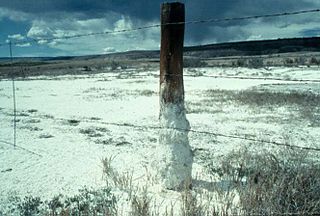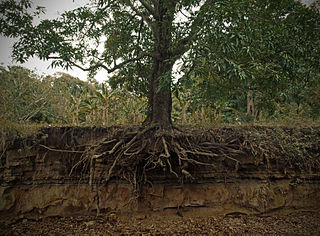Related Research Articles
In chemistry, an alkali is a basic, ionic salt of an alkali metal or an alkaline earth metal. An alkali can also be defined as a base that dissolves in water. A solution of a soluble base has a pH greater than 7.0. The adjective alkaline is commonly, and alkalescent less often, used in English as a synonym for basic, especially for bases soluble in water. This broad use of the term is likely to have come about because alkalis were the first bases known to obey the Arrhenius definition of a base, and they are still among the most common bases.

Soil salinity is the salt content in the soil; the process of increasing the salt content is known as salinization. Salts occur naturally within soils and water. Salination can be caused by natural processes such as mineral weathering or by the gradual withdrawal of an ocean. It can also come about through artificial processes such as irrigation and road salt.
A Ramsar site is a wetland site designated to be of international importance under the Ramsar Convention, also known as "The Convention on Wetlands", an intergovernmental environmental treaty established in 1971 by UNESCO, which came into force in 1975. It provides for national action and international cooperation regarding the conservation of wetlands, and wise sustainable use of their resources. Ramsar identifies wetlands of international importance, especially those providing waterfowl habitat.

Alkali, or Alkaline, soils are clay soils with high pH, a poor soil structure and a low infiltration capacity. Often they have a hard calcareous layer at 0.5 to 1 metre depth. Alkali soils owe their unfavorable physico-chemical properties mainly to the dominating presence of sodium carbonate, which causes the soil to swell and difficult to clarify/settle. They derive their name from the alkali metal group of elements, to which sodium belongs, and which can induce basicity. Sometimes these soils are also referred to as alkaline sodic soils.
Alkaline soils are basic, but not all basic soils are alkaline.

A soda lake or alkaline lake is a lake on the strongly alkaline side of neutrality, typically with a pH value between 9 and 12. They are characterized by high concentrations of carbonate salts, typically sodium carbonate, giving rise to their alkalinity. In addition, many soda lakes also contain high concentrations of sodium chloride and other dissolved salts, making them saline or hypersaline lakes as well. High pH and salinity often coincide, because of how soda lakes develop. The resulting hypersaline and highly alkalic soda lakes are considered some of the most extreme aquatic environments on Earth.

The residual sodium carbonate (RSC) index of irrigation water or soil water is used to indicate the alkalinity hazard for soil. The RSC index is used to find the suitability of the water for irrigation in clay soils which have a high cation exchange capacity. When dissolved sodium in comparison with dissolved calcium and magnesium is high in water, clay soil swells or undergoes dispersion which drastically reduces its infiltration capacity.
The Central Soil Salinity Research Institute is an autonomous institute of higher learning, established under the umbrella of Indian Council of Agricultural Research (ICAR) by the Ministry of Agriculture, Government of India for advanced research in the field of soil sciences. The institute is located on Kachawa Road in Karnal, in the state of Haryana, 125 km (78 mi) from the Indian capital of New Delhi.
Streptomyces fukangensis is an alkaliphilic bacterium species from the genus of Streptomyces which has been isolated from desert soil from Xinjiang in China.
Streptomyces sparsus is a bacterium species from the genus of Streptomyces which has been isolated from saline and alkaline soil in the Qinghai Province in China.
Nocardiopsis quinghaiensis is a Gram-positive and aerobic bacterium from the genus of Nocardiopsis which has been isolated from alkaline soil in Qaidam Basin in China.
Nocardiopsis terrae is a Gram-positive, halophilic, facultatively alkaliphilic and obligately aerobic bacterium from the genus of Nocardiopsis which has been isolated from saline soil from the Qaidam Basin in the Qinghai Province in China.
Streptomyces daqingensis is a bacterium species from the genus of Streptomyces which has been isolated from saline-alkaline soil in Heilongjiang in China.
Roseomonas alkaliterrae is a species of Gram negative, strictly aerobic, coccobacilli-shaped, pink-colored bacteria. It was first isolated from the soil around a geothermal hot spring in Tengchong, China. The species name refers to the alkaline soil from which the species was first isolated.
Fictibacillus solisalsi is a Gram-positive, rod-shaped, halotolerant, alkaliphilic and motile bacterium from the genus of Fictibacillus which has been isolated from saline soil from Shanxi in China.
Texcoconibacillus is a genus of bacteria from the family of Bacillaceae with one known species. Texcoconibacillus texcoconensis has been isolated from the lake Texcoco in Mexico.
Arenimonas soli is a Gram-negative, aerobic and non-motile bacterium from the genus of Arenimonas which has been isolated from saline-alkaline soil from Hanggin Banner from the Inner Mongolia.
Aliidiomarina soli is a Gram-negative, non-spore-forming and motile bacterium from the genus of Aliidiomarina which has been isolated from saline-alkaline soil from the Inner Mongolia in China.
Virgibacillus litoralis is a Gram-positive, moderately halophilic, endospore-forming, aerobic, rod-shaped and motile bacterium from the genus of Virgibacillus which has been isolated from saline soil.
Sphingobacterium olei is a Gram-stain-negative, rod-shaped, and non-motile bacterium. It was first isolated from oil-contaminated soil in Daqing oil field, China. S. olei has been found to be able to degrade herbicides quizalofop-p-ethyl and diclofop-methyl. Before a name was given, S. olei was designated as strain HAL-9T. The species name olei means "of oil" in Latin.
Glycocaulis albus is a Gram-negative, aerobic, mesophilic, moderately halophilic and motile bacterium from the genus of Glycocaulis which has been isolated from saline soil which was contaminated with petroleum from the Shengli Oilfield in China.
References
- 1 2 "Species: Halovibrio salipaludis". LPSN.DSMZ.de.
- 1 2 Tang, Liu; Liu, Hanxu; Sun, Wenni; Zhao, Juanjuan; Miao, Shaohua; Gong, Qi; Ma, Lian; Zhang, Guishan (January 2021). "Halovibrio salipaludis sp. nov., Isolated from Saline-Alkaline Soil". Current Microbiology. 78 (1): 429–434. doi:10.1007/s00284-020-02282-y. PMID 33219431. S2CID 227101757.